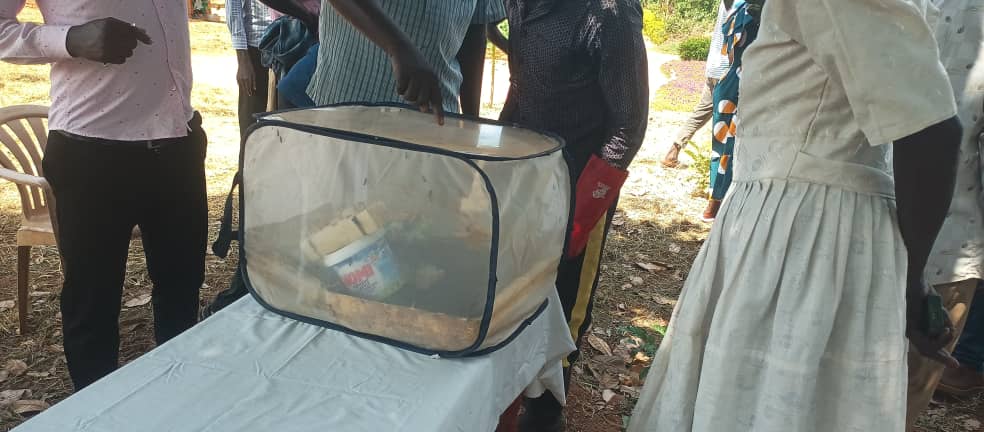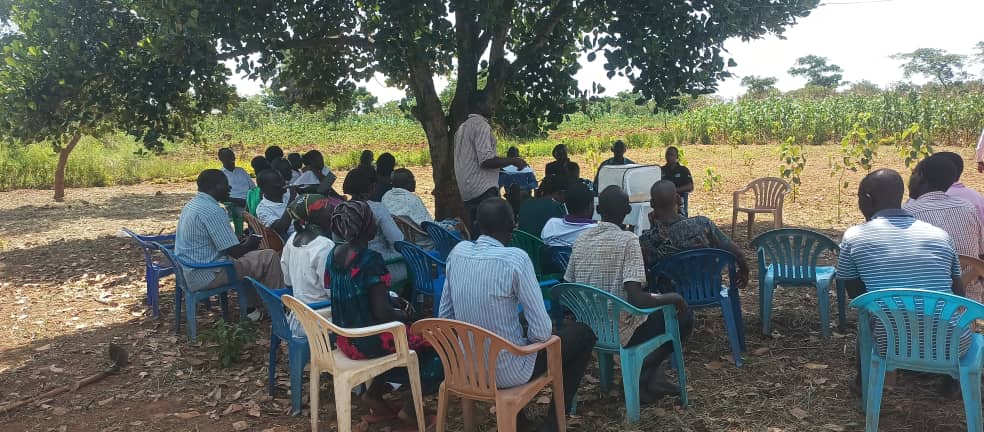
 Hot FM
Hot FM

 Hot FM
Hot FM
5 June 2025, 8:57 am

By Ivan Onyinge Bangwelo and Sarah Ejang
On Wednesday, May 4, 2025, a delegation from the Uganda Climate Smart Agriculture Transformation Project (UCSATP) visited Kioga Bridge Group Farm in Alemere Bung cell, Amolatar district, to assess the progress of climate-smart agricultural practices being implemented at the farm.
The visit brought together senior officials from the Ministry of Agriculture, Animal Industry, and Fisheries (MAAIF), who focused on evaluating the farm’s initiatives in piggery and black soldier fly (BSF) production.
The group was established on February 21, 2023, by Ojede James and started off as a small-scale piggery operation before expanding to include five dedicated members.
According to General Secretary Ojwang Denis, the adoption of BSF farming came after they received specialised training through UCSATP. This strategic pivot enabled the group to source sustainable protein for livestock feed while also effectively managing organic waste.
During their visit, the UCSATP team emphasised that the farm’s advancements directly align with the project’s main goal of promoting resilient agricultural technologies. Black soldier flies are particularly noted for their remarkable ability to convert organic waste into high-protein larvae, offering a dual benefit of reducing reliance on costly commercial feeds and addressing environmental concerns linked to waste disposal.
However, the team outlined that structural reforms are necessary for Kioga Bridge Group Farm to become eligible for further support.
Senior Entomologist Sebagala Hussin from MAAIF encouraged the group to reorganise its membership to comply with project requirements.
Additionally, Senior Agriculture Inspector Nakimuli Florence highlighted essential eligibility criteria, including the need for at least 40% female representation within the group and leadership roles. She underscored that the ideal group size should consist of 15–18 members from different households, prioritising inclusion of youth, women, and persons with disabilities.
Amolatar District’s Senior Entomologist, Okello Dulson, distinguished UCSATP from the Parish Development Model (PDM) due to its unique co-funding structure and climate-focused objectives.
He stressed that community development officers and extension workers should actively identify and support groups that can benefit from the project.

Ms. Apio Immaculate, Community Development Officer for Amolatar town council, praised the strides made by Kioga Bridge Farm, noting that their success in piggery has paved the way for integrating BSF farming into their operations.
Such initiatives serve as a model of inspiration for neighboring communities, showcasing the potential for growth and sustainability in agriculture.
Reflecting on his initial skepticism towards fly farming, Okello Denis expressed that the group’s perception has shifted since government investment in the initiative.
He acknowledged the importance of participation in BSF production, recognising it as an integral part of their development.
The overarching goal of UCSATP is to enhance productivity, improve market access, and reinforce the resilience of selected agricultural value chains while ensuring prompt responses to any emergencies.
This initiative is designed to assist the Government of Uganda in recognising, developing, and promoting the adoption of climate-smart agricultural technologies and management practices that facilitate climate adaptation within agricultural value chains, ultimately leading to sustainable productivity growth and increased household incomes.
Furthermore, the categorisation of farmer groups participating in UCSATP encompasses various sectors, including beef, mango, soybean, citrus farming, fisheries, and black soldier fly farming.
Currently, 163 groups in Amolatar are beneficiaries of the UCSATP grant scheme, marking a significant step forward in transforming agricultural practices in the region.